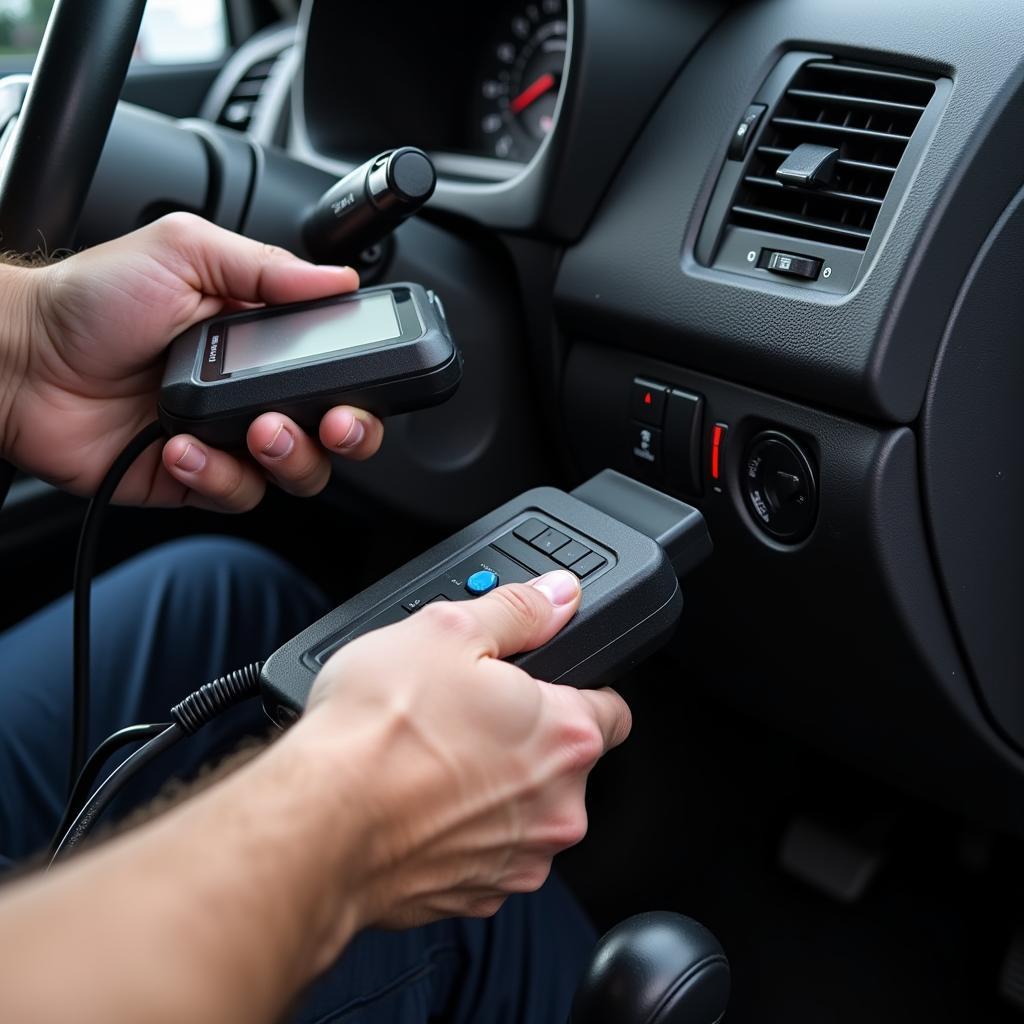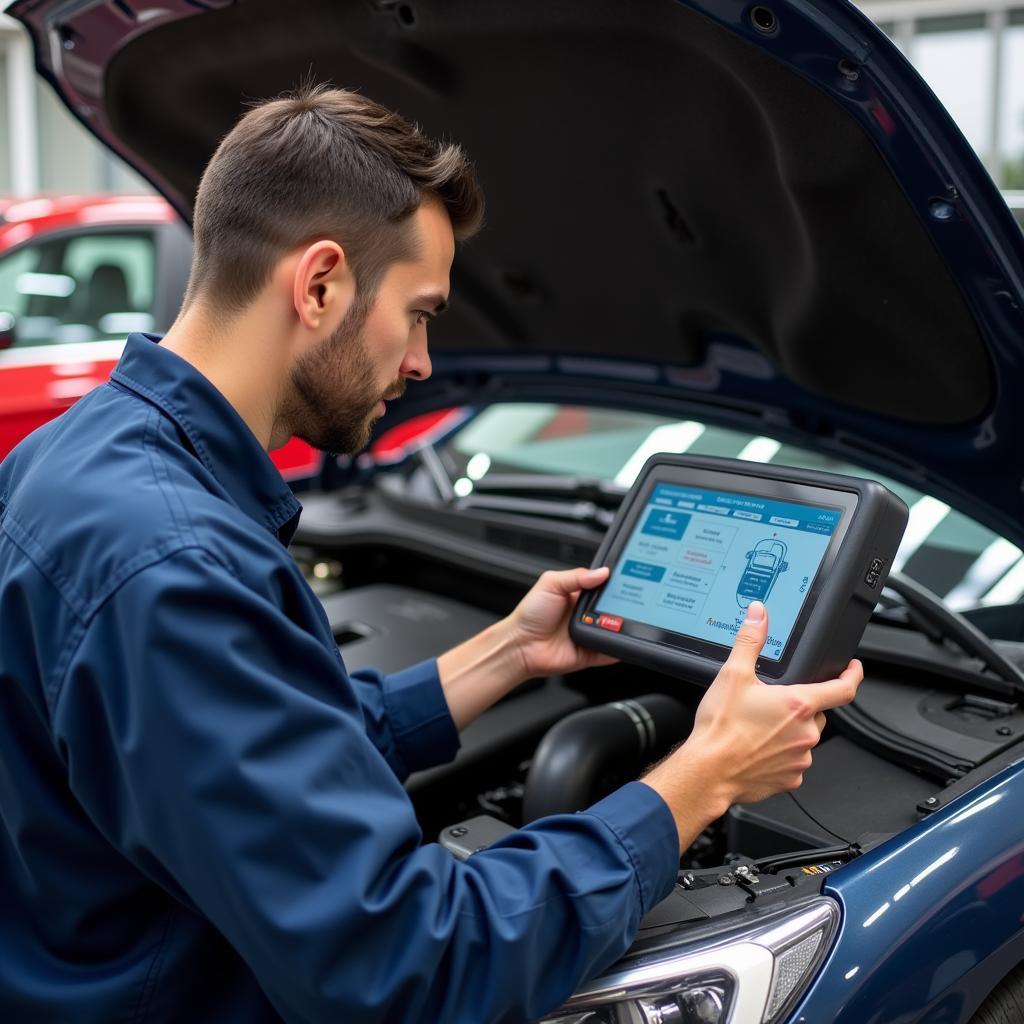Finding a reliable place to get a full diagnostic on your car can be a daunting task. With so many options available, it’s hard to know who to trust with your vehicle and your wallet. This comprehensive guide will explore the best places to get a full car diagnostic, the cost, what to expect, and answer frequently asked questions.
Understanding Car Diagnostics
Before we delve into where to get a diagnostic, let’s understand what a car diagnostic is and why it’s essential. In simple terms, a what is a diagnostic on a car is a procedure that uses a specialized scanner to communicate with your car’s computer system. This system, also known as the On-Board Diagnostics (OBD) system, monitors various sensors throughout your vehicle, collecting data on its performance. When the check engine light illuminates, it indicates a potential problem, and the OBD system stores a corresponding trouble code.
A car diagnostic scan retrieves these codes, providing valuable insights into the issue’s nature and location. Think of it as a health check-up for your car.
 Car Diagnostic Scan
Car Diagnostic Scan
Where to Get a Full Diagnostic on My Car?
You have several options when it comes to getting a full diagnostic on your car. Each has its pros and cons, so choosing the best fit for your needs and budget is essential.
1. Dealerships
Dealerships have specialized equipment and factory-trained technicians familiar with your car’s make and model. While they might be more expensive, they can be a good option for complex issues or newer vehicles with advanced technology.
2. Independent Mechanics
Independent mechanics are often more affordable than dealerships and can provide personalized service. Look for reputable shops with certified technicians, particularly those specializing in your car’s make.
3. Auto Parts Stores
Many auto parts stores offer free code reading as part of their services. However, keep in mind that this only retrieves the codes and doesn’t provide in-depth diagnostics or repair suggestions. It can be a good starting point to understand the general nature of the problem.
4. Mobile Mechanics
Mobile mechanics offer the convenience of coming to your location, saving you time and hassle. This is especially beneficial if your car is not drivable. Ensure the mechanic is certified and insured before hiring them.
 Mobile Mechanic Performing Diagnostics
Mobile Mechanic Performing Diagnostics
How Much Does a Full Diagnostic Cost?
The cost of a full car diagnostic can vary depending on several factors, including your location, the type of vehicle, and the complexity of the problem. On average, you can expect to pay between $80 to $180 for a diagnostic scan.
Here’s a general breakdown:
- Dealerships: $100 – $180
- Independent Mechanics: $80 – $150
- Auto Parts Stores: Free (code reading only)
- Mobile Mechanics: $100 – $200
Important Note: Some mechanics might waive the diagnostic fee if you have the repairs done at their shop.
What to Expect During a Full Diagnostic
When you take your car for a full diagnostic, the mechanic will typically follow these steps:
- Connect a scan tool: The mechanic will connect a diagnostic scanner to your car’s OBD-II port, usually located under the dashboard on the driver’s side.
- Retrieve trouble codes: The scanner will communicate with your car’s computer and retrieve any stored trouble codes.
- Interpret the codes: The mechanic will use their knowledge and expertise, along with repair manuals and databases, to interpret the codes and identify the potential problem areas.
- Perform visual inspections: Depending on the codes retrieved, the mechanic might perform visual inspections of related components to assess their condition and confirm the diagnosis.
- Provide a repair estimate: Once the problem is identified, the mechanic will provide you with a detailed repair estimate outlining the necessary parts and labor costs.
 Mechanic Discussing Diagnostic Results with Customer
Mechanic Discussing Diagnostic Results with Customer
Can I Diagnose My Car Myself?
With the advancement of technology, affordable OBD-II scanners are available for purchase, allowing car owners to perform basic diagnostics themselves. These scanners can retrieve and clear trouble codes, providing some insight into the potential issues. However, it’s crucial to remember that interpreting the codes accurately and diagnosing car problems requires significant knowledge and experience. While using a DIY scanner can be helpful for minor issues, it’s always recommended to consult a qualified mechanic for complex problems or before attempting any repairs yourself.
Frequently Asked Questions
1. What is the difference between a code reading and a full diagnostic?
A code reading simply retrieves the trouble codes stored in your car’s computer, while a full diagnostic goes beyond code retrieval. It involves analyzing the codes, performing visual inspections, and providing a comprehensive assessment of the problem.
2. Will a car diagnostic scanner reset airbag code?
While some advanced scanners might have the capability, resetting an airbag code requires addressing the underlying issue that triggered the warning light. It’s crucial to have a qualified mechanic diagnose and repair any airbag-related problems to ensure proper functioning and safety. For more detailed information, refer to our dedicated article on “will car diagnostic scanner reset airbag code.”
3. Do I need a diagnostic if my check engine light is flashing?
A flashing check engine light usually indicates a more severe problem that requires immediate attention. It’s best to stop driving and have your car towed to a mechanic for a diagnostic as soon as possible.
4. Can I drive my car with the check engine light on?
While you might be able to drive for a short distance with the check engine light on, it’s not recommended. Ignoring the warning light could potentially worsen the issue, leading to costly repairs.
5. How often should I get a car diagnostic?
It’s a good practice to include a car diagnostic as part of your regular vehicle maintenance. This preventative approach can help identify potential issues early on, preventing costly repairs and breakdowns down the line.
Conclusion
Knowing where to get a full diagnostic on your car is crucial for maintaining its health and addressing any issues promptly. By understanding the various options available, the cost involved, and what to expect during the process, you can make informed decisions about your car’s maintenance and ensure its optimal performance. Remember, a well-maintained car is a safe and reliable car.
Need assistance with your car’s diagnostics or repairs?
Contact our expert team via WhatsApp: +1(641)206-8880 or Email: [email protected]. We’re available 24/7 to answer your questions and provide top-notch support.

Leave a Reply